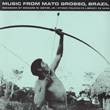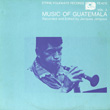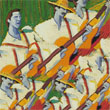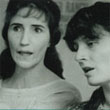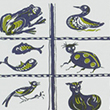Songs of Struggle and Hope by Agustín Lira
Agustín Lira and Alma SFW40567
A powerhouse of the farmworker and Chicano civil rights movements, social activist Agustín Lira spun out songs that fueled the pioneering political theater group Teatro Campesino. From the United Farmworkers grape strike in 1965 through the next half-century of his original music with a message, Lira tenaciously tells the truth as he sees it. On Songs of Struggle and Hope, he and his trio Alma treat us to signature songs of La Causa as well as to new creations that speak of homelessness, child obesity, personal loss, and hope for the future. 61 minutes, 40-pages of bilingual notes and photos.
This album is the 44th in the Smithsonian Folkways Tradiciones/Traditions Series of Latino music albums, produced with support from the Smithsonian Latino Center.
EN ESPAÑOL
Un proponente del movimiento de los trabajadores campesinos y por los derechos civiles chicanos, el activista social Agustín Lira produjo canciones que alentaron al Teatro Campesino, grupo pionero del teatro político. Desde la huelga de las uvas de los trabajadores del campo unidos (United Farmworkers) en 1965 a través de la siguiente mitad de siglo por medio de su música original con mensaje, Lira tenazmente cuenta la verdad como la ve. En Cantos de Lucha y Esperanza (Songs of Struggle and Hope), él y su Trio Alma nos brindan tanto canciones de La Causa como creaciones nuevas que hablan del desamparo, la obesidad juvenil, la pérdida personal, y la esperanza para el futuro.
Este álbum es el número 44 de la serie de Folkways Tradiciones/Traditions de álbumes de música latina, producidos con el apoyo del Smithsonian Latino Center.
FREE DOWNLOAD
Please enjoy a free download of “Quihubo, Raza (What’s Happening, People)”
| Quihubo, Raza (What’s Happening, People) | MP3 | FLAC |
Record Label Smithsonian Folkways Recordings
Source Archive Smithsonian Center for Folklife and Cultural Heritage
Copyright 2016 Smithsonian Folkways Recordings
Instrument(s) Bass; Button accordion; Guitar; Jarana; Percusión; Percussion; Vihuela; Vocals
Credits
- Daniel E. Sheehy - Producer; Photographer
- Pete Reiniger - Engineer
- Eric Sherbon - Mixing Engineer
- Pete Reiniger - Mastering Engineer
- Russell C. Rodríguez - Liner Notes
- Cristina Altamira - Translator
- Tom Pich - Photographer (Cover)
| 101 | Quihubo, Raza (What’s Happening, People) | Agustín Lira and Alma | 3:57 | ||
| 102 | El inmigrante (The Immigrant) | Agustín Lira and Alma | 5:03 | ||
| 103 | Juan Cortina | Agustín Lira and Alma | 3:40 | ||
| 104 | Alma (Soul/Spirit) | Agustín Lira and Alma | 3:28 | ||
| 105 | Gregorio Cortez | Agustín Lira and Alma | 3:11 | ||
| 106 | Summer Winds (Vientos de verano) | Agustín Lira and Alma | 4:20 | ||
| 107 | Los zapatistas (The Zapatistas) | Agustín Lira and Alma | 3:53 | ||
| 108 | The Leaf (La hoja) | Agustín Lira and Alma | 4:43 | ||
| 109 | If You’re Homeless (Si eres desamparado) | Agustín Lira and Alma | 3:03 | ||
| 110 | El indio (The Indian) | Agustín Lira and Alma | 3:21 | ||
| 111 | Taps for Coke (Toque de queda para Coca) | Agustín Lira and Alma | 4:03 | ||
| 112 | She Won’t be There (Ella no estará allí) | Agustín Lira and Alma | 4:11 | ||
| 113 | I Have Been Here Forever (Yo he estado aquí por siempre) | Agustín Lira and Alma | 3:38 | ||
| 114 | The Old Man (El viejo) | Agustín Lira and Alma | 4:38 | ||
| 115 | Ser como el aire libre (Be Free Like the Wind) | Agustín Lira and Alma | 2:44 | ||
| 116 | When I Die (Cuando yo me muero) | Agustín Lira and Alma | 3:15 |



 view cart
view cart



